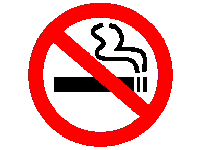We Fought Cancer And Won!
since cancer struck!

Most lung cancer is caused by cigarette smoking. Tobacco smoke contains manycarcinogens–harmful substances that damage cells. Over time, these cells can become cancerous. The more a person smokes, the higher the risk of getting cancer-not just lung cancer, but also cancers of the mouth, throat, esophagus, larynx, bladder, kidney, cervix, and pancreas.
It is clear that thousands of lives could be saved each year if people did not smoke. For this reason, we strongly encourage smokers to quit. The risk of lung cancer begins decreasing slowly as soon as a person quits smoking. The earlier the age at which a person quits, the closer a former smoker's risk of lung cancer will approach the risk for a person who never smoked.
Although quitting early is best, smokers should know that it is never too late to benefit from quitting-even if they have lung cancer. Lung cancer patients who stop smoking are less likely to get a second lung cancer than are patients who continue to smoke.
Many programs are available to help people stop smoking. The Cancer Information Service, the American Cancer Society, and the American Lung Association can offer advice about quitting and can give you information about programs in your area. Information about these organization is found in the Resources section of this guide.
Although smoking is by far the major cause of lung cancer, it is not the only cause. Exposure to other people's tobacco smoke (environmental tobacco smoke) increases the risk of lung cancer among nonsmokers. Think of your children! Scientists have found that nonsmokers who live or work with smokers have a higher lung cancer risk than nonsmokers who do not face this type of exposure to environmental tobacco smoke.
Oh yeah.... Sue and Paul smoked for almost 65 years... talk about STUPID! Sue's father, Paul's mother, uncles/aunts.... all dead because of a stupid habit!
